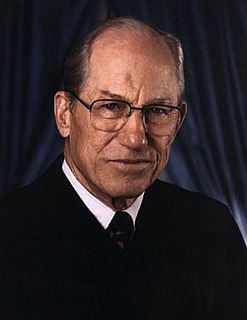A Quote by Charles Caleb Colton
When we feel a strong desire to thrust our advice upon others, it is usually because we suspect their weakness; but we ought rather to suspect our own.
Related Quotes
It is not better that all felony suspects die than that they escape. Where the suspect poses no immediate threat to the officer and no threat to others, the harm resulting from failing to apprehend him does not justify the use of deadly force to do so. It is no doubt unfortunate when a suspect who is in sight escapes, but the fact that the police arrive a little late or are a little slower afoot does not always justify killing the suspect.
I fish because I love to . . . because I love the environs where trout are found . . . because I suspect that men are going along this way for the last time, and I for one don’t want to waste the trip . . . and, finally, not because I regard fishing as being so terribly important but because I suspect that so many of the other concerns of men are equally unimportant––and not nearly so much fun.





































